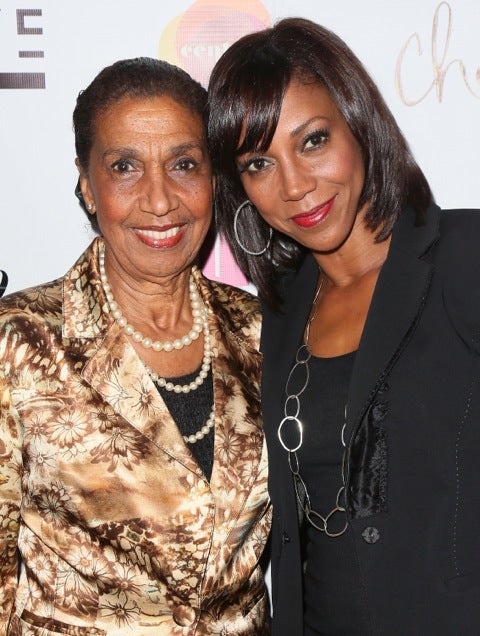
Editor’s Note: The following is a first person essay written by Holly Robinson Peete in honor of her mother, Dolores, this National Grandparents Day.
As a mother of four active children between the ages of 8 and 16, I can use every ounce of extra help that comes my way. I count myself lucky in this respect because I know I can depend on my mother, Dolores, to swoop in and save the day when life gets hectic.
Gramz, as my eldest son calls her, is a constant presence in my children’s lives. When my husband and I recently traveled to Italy, she held down the fort and mastered the kids’ busy schedules. She cheers wildly at little league games, and always looks for new ways to bond with her grandchildren. Each one of them has a plot in her garden, where they grow artichokes, tomatoes and cucumbers.
It’s for these reasons that I celebrate my mother every day, but National Grandparents Day is a special time to reflect on what a blessing she is to my family. This holiday doesn’t get the same attention as those set aside for mothers and fathers, but it should: Devoted grandparents create a true multigenerational family, forging a vital connection that helps us relish the good times and weather life’s difficult moments.
For parents like me – a baby boomer with an aging parent and young children, often referred to as the “sandwich generation”, – this is no small thing. Seniors are living longer now than ever before, and while grandparents help with our families, we must ensure that we are faithful stewards in their time of need as well.
This is a lesson that came painfully early for me when my father was diagnosed with Parkinson’s disease at age 45. I was a college student at the time and unprepared for the demands of being a caregiver. Along with my brother, I helped manage his care, which got harder as his disease progressed and I became a wife and mother. Like many of this country’s 65 million caregivers, my father was not the only person I was looking after. My first son was diagnosed with autism as a 3-year-old, and I sprung into action, looking for the right treatments and remedies.
During these years, until my father’s death in 2002, I had to make some heart wrenching decisions on behalf of him and my son. These were not easy times, and surviving them required support and guidance from doctors, friends and family. Yet, I emerged from that period with a profound understanding of what it means to be a caregiver, and I do my best to share those lessons with those who will listen.
I am beyond grateful that my mother, who is a cancer survivor, is healthy, happy and shares herself so generously with my children. My mother has a full and vibrant life. She lives on her own with two 60-pound tortoises (Ike and Tina Turtle) and doesn’t mind when passersby see them in the front yard and want to take a photograph.
I want her to live as fully as possible, but I know that an illness may eventually threaten her independence or mental sharpness. Most seniors have at least one chronic condition, including arthritis, heart disease, diabetes and cancer.
Sometimes life shocks you with an unexpected diagnosis, as it did in my father’s case, but we often know what challenges our parents face as they grow older. It’s crucial that we are prepared to talk honestly about the future and how they will maintain their good health or deal with crisis. I’ve had these conversations with my mother, and though we might shed some tears, I believe our openness only makes our family stronger.
I know one day I’ll have the same talks with my children. Though that moment is hopefully far away, I do dream of borrowing inspiration from the example my mother set. I could think of no greater honor than to become the tie that binds my family’s family.
